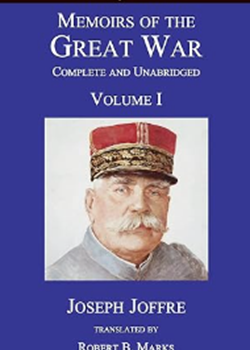Memoirs of the Great War: Complete and Unabridged, Volume I
- Home
- World War I Book Reviews
- Memoirs of the Great War: Complete and Unabridged, Volume I

Legacy Books Press, (2022) £20.95, 472 pp.
maps, b/w photos and index
ISBN 978–1–927537– 65–7
It would be difficult to think of a person more suited to command the French army in the first months of the Great War than Joseph Joffre. At a time when all about him were losing their heads, occasionally literally, Joffre kept his. His refusal to accept defeat when the clear possibility was staring his country in the face makes him a far bigger figure than many sometimes acknowledge.

Stolid of temperament, solid of build, a man of few vices apart from a love of hearty meals, and even fewer words. Long before he was deposed at the end of 1916 his critics, military and political, were loud and plentiful. In 1922 he began the gargantuan project of preparing his memoirs which were finally published in 1928. Four years later Colonel T Bentley Mott’s much–abridged two–volume English translation appeared. Now, at last, the interested reader can read his thoughts in full, in English.
This first volume begins in 1910 when ‘Papa’ Joffre – so known by those who didn’t know him due his misleadingly benign countenance, all walrus–moustache and tubby frame – joined the senior echelons of the French army after a career in hard overseas postings. He was almost immediately promoted to Chief of Staff and C–in–C designate in case of war and his memoir details how he attempted to hone a modern fighting force. The first half of this volume – which concludes in the autumn of 1914 – covers the all–important pre–war period, 15,000 words of which were dispensed with by Mott. While this is understandable, Mott was writing for a post–war British readership – what is now available casts important light on Joffre’s work on infantry tactics and his understanding of the essential nature of all forms of artillery, especially heavy. His success was patchy. Fighting against the largest, best–equipped and best–trained army in the world, the French, with their numerically inconsequential British and Belgian allies, spent much of August on the back foot. Joffre’s horror, anger and frustration at incompetent French infantry tactics is evident reading his words a century later.
The consequences were maulings and push–back in Alsace–Lorraine on the French right and serious defeats on the left while the Germans made their wheeling movement through Belgium. French armies and their BEF allies retreated, the French government fled Paris for Bordeaux. The C–in–C of the BEF, Field Marshal Sir John French, his retreating army exhausted after the Battle of Mons (an event which doesn’t even receive a footnote in these memoirs), wanted to pull his force out of the fight to recover. His Chief of Staff Archie Murray suffered two nervous collapses and Kitchener had to remind French of his duties. Chaos and incompetence in the French senior command saw Joffre’s political master calling for executions of the officers who had failed. At least one French commander lost his nerve and shot himself.
By the end of August, the French army had already suffered more than 200,000 casualties. Commanding six armies, over a line of more than 400 kilometres, Joffre somehow managed to keep his head. Refusing to surrender Paris his level head devised a plan to halt the German advance on the Marne, resulting in a major victory in which a revitalised BEF played no small part. The next volume covers 1915; a year of even greater carnage and one in which Joffre’s reputation came under serious pressure. I’m looking forward to it already.
Review by John Spencer
This review first appeared in the October edition of Stand To! No.128





